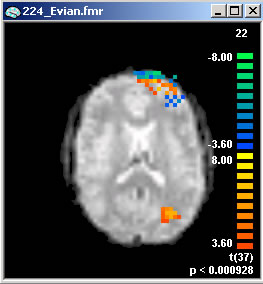Florida Researchers Probe Emotions and Ads
 Researchers at the University of Florida have published the results of their first advertising study using fMRI, a project intended to try to relate brain scan data to specific emotions being experienced by the subjects while viewing ads. Jon Morris, a professor of advertising and communications at Florida, was critical of past fMRI studies, noting, “There was no real key happiness center, no key sad center, no key love center. What you got was brain activity, in general.” The Florida study was intended to narrow the focus of relating emotions to brain scans by giving the subjects a novel way to let researchers know what they were feeling:
Researchers at the University of Florida have published the results of their first advertising study using fMRI, a project intended to try to relate brain scan data to specific emotions being experienced by the subjects while viewing ads. Jon Morris, a professor of advertising and communications at Florida, was critical of past fMRI studies, noting, “There was no real key happiness center, no key sad center, no key love center. What you got was brain activity, in general.” The Florida study was intended to narrow the focus of relating emotions to brain scans by giving the subjects a novel way to let researchers know what they were feeling:
The 12 subjects also had hand-held devices that enabled them to report their feelings via a system called “Attitude Self Assessment Manikins” a version of the UF-developed Self-Assessment Manikin, or “SAM.” The “AdSAM” system lets viewers describe how they are feeling and the strength of those feelings by clicking on projections of people-like icons, a process that Morris characterized as more direct than translating feelings into words. Morris uses the AdSAM system in his work as a consultant to advertisers. [From Advertisers, neuroscientists trace source of emotions in brain.]
The researchers showed the subjects commercials for Coke, Evian, and Gatorade, as well as an anti-fur spot and a teaching publlic service announcement. At least as reported, the conclusions seem less than startling:
Where the researchers compared the AdSAM data on pleasure-displeasure and excitement-calm to the fMRI data, they found simultaneous spikes in four different and highly localized areas of the brain. According to the article, the findings suggest “that human emotions are multidimensional, and that self-report techniques correspond to a specific task but different functional regions of the brain.”
At first glance, this statement seems on a par with “Hillary Clinton was found to cause negative reactions in some subjects” in terms of being blandly obvious. Still, I’m happy to see a new university player in the neuromarketing arena, and in particular one whose efforts seem to be driven more by the marketing department.
In particular, I think the idea of employing other measures of the subject’s experience that can be correlated with the fMRI data is a good one. I’m looking forward to more detailed results from UF researchers in the future.
More information on the commercial services offered by Morris can be found at Adsam.com, including some preliminary fMRI study info.
